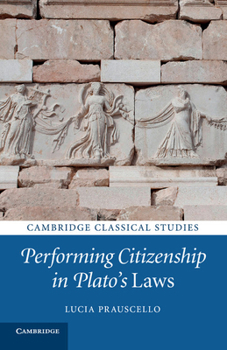Performing Citizenship in Plato's Laws
(Part of the Cambridge Classical Studies Series)
Select Format
Select Condition 
Book Overview
In the Laws, Plato theorizes citizenship as simultaneously a political, ethical, and aesthetic practice. His reflection on citizenship finds its roots in a descriptive psychology of human experience, with sentience and, above all, volition seen as the primary targets of a lifelong training in the values of citizenship. In the city of Magnesia described in the Laws er s for civic virtue is presented as a motivational resource not only within the reach...
Format:Paperback
Language:English
ISBN:1107421160
ISBN13:9781107421165
Release Date:October 2017
Publisher:Cambridge University Press
Length:282 Pages
Weight:0.73 lbs.
Dimensions:0.6" x 5.5" x 8.5"
Customer Reviews
0 rating





